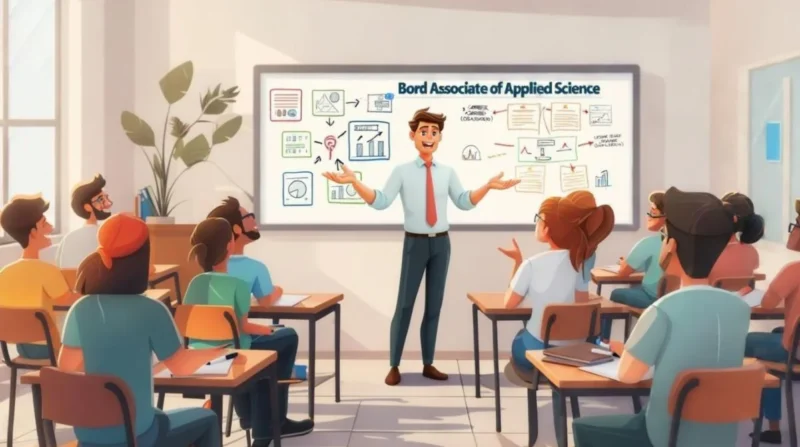Table of Contents
An Associate of Applied Science (AAS) is a two-year college credential designed for people who want hands-on training in specific careers without spending four years earning a bachelor’s degree.
Unlike liberal arts degrees, this program is built around technical or vocational fields like healthcare, engineering, cybersecurity or skilled trades focusing on immediately applicable skills Unlike an Associate of Science (AS) or Associate of Arts (AA), which include general education and are often used to transfer toward a bachelor’s, the AAS prioritizes job-ready abilities and real-world practice. Think less theory, more labs, workshops, internships, and industry tools.
Duration & Credits
You’ll study technical subjects central to your field. For example, in an AAS in IT, you might take courses in networking, databases, and programming alongside English and communication. Most programs emphasize:
Major-specific classes with labs and practical projects. General education courses to build communication, writing, and critical thinking skills.
Experience-based learning, like clinicals in healthcare or workshops in trades. This hands-on approach helps graduates hit the ground running in the job market.
Benefits of an AAS Degree
- Fast entry into the workforce: Ready for a job in just two years.
- Clear career direction: Ideal if you know the field you want to enter, healthcare, IT, skilled trades, etc.
- Cost-effective education: Typically, cheaper than four-year degrees.
- Job-ready skills: Employers value the practical training AAS grads bring.
- Optional transfer path: Some schools let you build on your AAS with a bachelor’s degree.
Career Paths
AAS degrees cover many fields. Here are some popular areas and job outcomes:
- Healthcare: Medical assistant, radiologic tech, nursing unit coordinator.
- IT & Cybersecurity: Network technician, IT support specialist, cybersecurity associate.
- Skilled Trades: HVAC technician, automotive service technician, welder.
- Business & Accounting: Bookkeeper, accounting clerk, small business admin.
- Creative & Service: Graphic design technician, cosmetology/wellness assistant.
Salary expectations vary by role and region, but many AAS jobs offer solid entry-level pay, especially with certification or licensing.
Cost & Financial Aid
- AAS programs at community colleges are typically funneled to be affordable, costing significantly less than private or four-year colleges.
- Expect to pay per credit; 60 credits could cost between $5,000–$15,000 at public institutions, depending on where you live and your school’s tuition rates.
- You’re usually eligible for financial aid, including federal grants and scholarships, just complete the FAFSA.
AAS vs Other Degrees: What’s Best for You?
- AAS 2 yrs Hands-on, job-focused Students ready to work quickly.
- AS/AA 2 yrs Academic, general ed Students planning to transfer.
- Bachelor’s 4 yrs. In-depth academic and career training. Students aiming for advanced roles.
Choose AAS if you’re career-focused on roles like technician, assistant, or specialist, and want to enter the job market fast and affordably, or opt for AS/AA if your goal is further study. A bachelor’s suits you if you want leadership roles or advanced research opportunities.

Transfer Options
Some AAS programs offer transfer-credit agreements for a bachelor’s degree, especially in applied science fields. It’s smart to:
- Check whether your credits are transferable before enrolling.
- Work with your advisor to follow agreed-upon transfer pathways.
- Use your AAS as a stepping stone if you plan to earn a bachelor’s.
Requirements & Graduation
To earn an AAS, you’ll generally need to:
- Complete 60–90 credits, including major and general education.
- Maintain a minimum GPA, usually around 2.0 to 2.5.
- Finish practical components like labs, internships, or externships.
- Meet any residency requirements, such as completing a set number of credits at the institution.
- Submit your graduation forms as you approach the end of your final term.
Is an AAS Worth It in 2025?
Yes, if:
- You want to launch your career quickly.
- You know the field you want to enter.
- You prefer practical, hands-on learning over theory.
- You want to avoid the cost of a four-year degree.
According to the American Association of Community Colleges, nearly 800,000 associate degrees were awarded in 2022–2023. Many AAS grads find employment soon after graduation, and the hands-on focus appeals to employers.
Choosing the Right AAS Program
When picking a program, look for:
- Regional accreditation means accepted quality and an easier transfer.
- Industry alignment Programs should match job market needs.
- Hands-on learning Labs, internships, and equipment matter.
- Transfer agreements. If you want a bachelor’s later, confirm pathways.
- Support services include Career counseling, job placement help, and tutoring.
Conclusion
The Associate of Applied Science is a practical, career-focused degree that gives you the skills to work in two years. It’s affordable, clearly directed, and aligns with today’s job market. If you’re focused on a technical or skilled profession and want to start building your career sooner, an AAS for 2025 is a smart choice, especially if you pair it with certifications or later goals like a bachelor’s. Choose a good program, commit to hands-on learning, and use your AAS as a stepping stone for career success.
Related Topic: Psychology Degree Guide: Career Paths, Specializations & More









